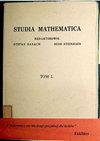贪婪近似中基底不条件性的弱形式
IF 0.9
3区 数学
Q2 MATHEMATICS
引用次数: 6
摘要
从Banach空间的抽象角度来看,使用基的(非线性)贪婪近似理论源于Konyagin和Temlyakov在1999年对贪婪基的开创性描述,即贪婪基是同时无条件和民主的[16]。这两个性质是先验的,彼此独立,我们发现无条件基的例子是不民主的,而在理论的早期阶段就已经相反了(例如,参见[7,例子10.4.4])。然而,一些空间X的几何结构可以使这些性质交织在一起,X中的无条件半正规化基础最终是民主的(因此是贪婪的)。这是Hilbert空间中的无条件基的情况,例如在空间l1和c0中也是如此(参见[12,定理4.1],[21,定理3]和[10,推论8.6])。本文章由计算机程序翻译,如有差异,请以英文原文为准。
Weak forms of unconditionality of
bases in greedy approximation
From the abstract perspective of Banach spaces, the theory of (nonlinear) greedy approximation using bases sprang from the seminal characterization of greedy bases by Konyagin and Temlyakov in 1999 as those bases that are simultaneously unconditional and democratic [16]. These two properties are, a priori, independent of each other and we find examples of unconditional bases which are not democratic and the other way around already in the very early stages of the theory (see, e.g., [7, Example 10.4.4]). However, the geometry of some spaces X can make these properties intertwine, to the extent that the unconditional semi-normalized bases in X end up being democratic (hence greedy). This is the case of unconditional bases in Hilbert spaces, and also in the spaces l1 and c0 for instance (see [12, Theorem 4.1], [21, Theorem 3] and [10, Corollary 8.6]).
求助全文
通过发布文献求助,成功后即可免费获取论文全文。
去求助
来源期刊

Studia Mathematica
数学-数学
CiteScore
1.50
自引率
12.50%
发文量
72
审稿时长
5 months
期刊介绍:
The journal publishes original papers in English, French, German and Russian, mainly in functional analysis, abstract methods of mathematical analysis and probability theory.
 求助内容:
求助内容: 应助结果提醒方式:
应助结果提醒方式:


